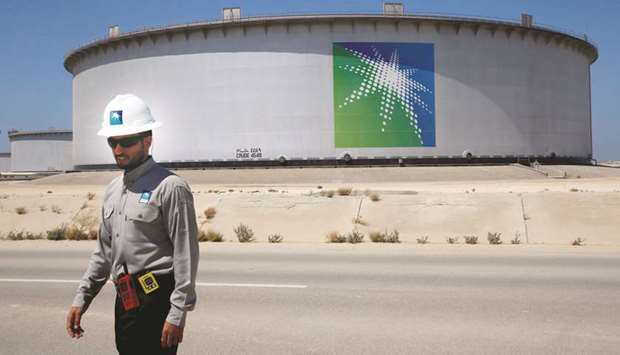The slump in Aramco bonds since its unprecedented debt sale this month makes one thing clear: You can’t take the Saudi out of Saudi Aramco.
With bids topping $100bn, Aramco managed to raise $12bn at lower yields than the kingdom itself, which is uncommon in corporate bond markets. Investors are now paying the price for that discrepancy: All five maturities have fallen since trading started last week, in some cases by more than 2 cents on the dollar.
“We view the company as more of a Saudi risk rather than just an energy company,” said Patrick Wacker, a fund manager at Singapore-based UOB Asset Management Ltd who dumped his holdings on the first day of trading to profit from the initial euphoria. He predicts the debt will keep falling until it trades at a yield premium to the Saudi government.
If he’s right, there’s still a ways to go before the Aramco bond selloff is over. The company’s $3bn of notes due in 2029 yielded 3.77% as of 11.12am London time, less than the 3.87% on similar-maturity Saudi government debt sold in January.
Given the order size at the sale, many investors expected the world’s biggest oil producer, known officially as Saudi Arabian Oil Co, would get away with lower yields than the government and instead be compared with global peers such as London-based BP Plc, whose notes due in 2028 yielded 3.45%.
Moody’s Investors Service said this month “close interlinkages” with the sovereign prompted it to grade Aramco in line with the Saudi government, which is ranked lower at A1.
Saudi Aramco bonds have been slumping since an unprecedented debt sale earlier this month.
Aramco is integral to the economy of Saudi Arabia, which has been ramping up debt sales in recent years as falling oil prices left it with budget deficits. The oil industry accounted for more than 60% of the kingdom’s revenue in 2017 and about half of Aramco’s board is composed of government officials. The money raised is also being used to finance Saudi Arabia’s economic agenda after the state postponed until at least 2021 plans to sell a stake in Aramco in an initial public offering.
Some investors who spoke to Bloomberg said a number of bondholders trimmed their positions because they had inflated the size of their initial orders to ensure they’d get a slice of the offering. Others sold because their allocations were too small to make a difference to their portfolios, they said.
The 2039 notes were trading at 96.92 cents on the dollar yesterday, compared with an issue price of 99.161.
“We did not participate in the new deal as they priced inside the sovereign,” said Wouter Van Overfelt, a Zurich-based senior money manager at Vontobel Asset Management. “While there may be good reasons for this to be the case, we would generally prefer the sovereign in such cases.”
Even so, Wacker at UOB Asset Management, which oversees about $24bn, said the price drop could leave a bitter taste with investors given all the initial hype.
“This may not have been the best way to start a capital-markets relationship with bond investors,” he said.

An Aramco employee walks near an oil tank at the Ras Tanura oil refinery and oil terminal in Saudi Arabia (file). Aramco bonds have been slumping since an unprecedented debt sale earlier this month.


